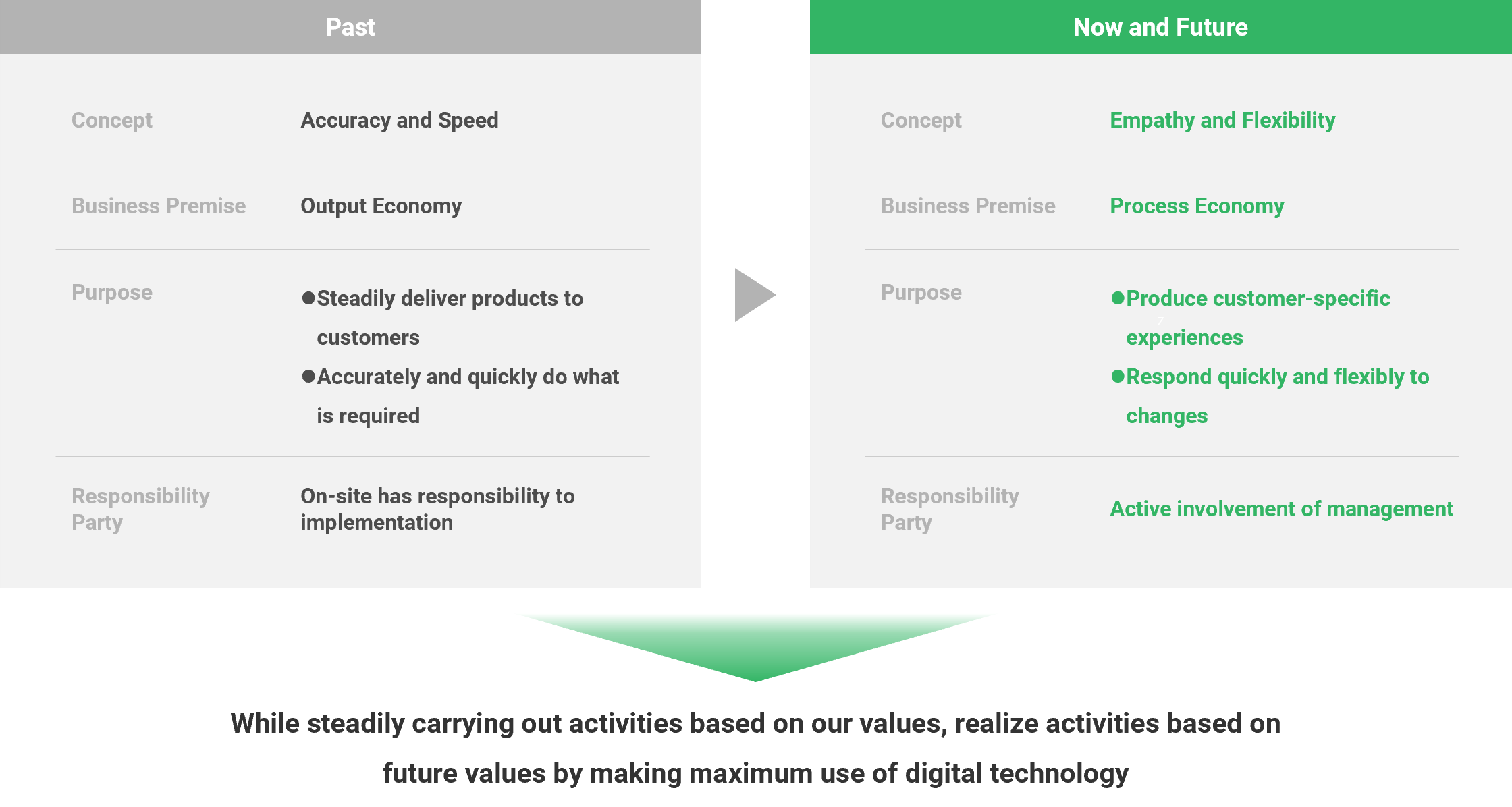SERVICES
The important themes for transformation that LTS considers
In the midst of a drastically changing business environment, business process management is now a concept that is attracting renewed attention. Until now, the primary motivation for companies to engage in business process management has been to maintain and improve the quality of operations in the field. Having the staff in charge of each task understand and be able to explain their own work is the basis of a “strong worksite (= worksite capability)” that can autonomously promote various activities such as employee training, investigating the causes of problems, and promoting business improvement. However, in the current changes surrounding corporate management, business process management is required to play not only this role in the past, but also a new role adapted to the changing environment.
Customers’ purchasing behavior today is not just about buying highly functional products and services (i.e., functional value), but is also about pursuing their own individuality by obtaining unique products, having special experiences through the entire customer experience, including choosing, using, and sometimes creating products and services together with the business, and sharing these experiences with others to create “connections. The emphasis is on the “connection” that is gained by sharing these experiences with others. This type of market is called a “process economy.
In the past, the objectives of business process management activities were mostly to improve the quality and lead time of products and services and to reduce costs (so-called “QCD”), because business was based on the “output economy” of “selling products. This is because business was based on the premise of an “output economy” of “selling products. A company’s competitiveness was in the products and services themselves, and the business process was merely a means to deliver these to the customer. It was a world of doing what was required accurately and quickly, and there was little need to create new value in the process itself.
In the process economy, however, the entire lifecycle of a customer’s interaction with the company must be viewed as a single process to produce a valuable experience. In this changing environment, business process design has come to play a role in creating value for customers.
In today’s business environment, customer preferences are becoming more diverse and sophisticated, and products and services are becoming increasingly complex. Moreover, these preferences are changing rapidly, and today’s management is a world where complexity and speed are simultaneously progressing.
In such an environment, it becomes difficult for companies to formulate highly accurate strategies and execute them systematically. Therefore, instead of spending a lot of time on strategy and planning, business strategy management is shifting to a hypothesis-testing approach, in which products and services are quickly materialized and brought to market, and both strategies and processes are quickly reviewed by observing customer reactions and data coming up from business processes.
For this to work, the operation of the business process must be linked to the speed at which the strategy operates. To leverage data to make decisions quickly, it is still necessary to embed a mechanism for this in the business process.
No longer are strategy formulation, business process development, process execution, and strategy review in a high-speed cycle; process management itself is now inextricably linked to strategy management.
The future of business process management, in addition to the old values of “accuracy and speed,” will also emphasize “empathy and flexibility.
Changing values of business processes

In this complex business environment, trying to quickly meet the different expectations of customers is impossible by human power alone and inevitably requires the help of various digital technologies. Business process management today is inextricably linked to digital transformation (DX).
The penetration of digital technology has also drastically changed the capabilities required for business process design. In the past, business operations were learned through on-the-job experience, and improvements were made repeatedly by reflecting the insights of experience. However, robots and information systems are replacing business performers. If it is not possible to understand business operations only from rules of thumb, employees need to understand the logic of business operations that have become black boxes inside digital solutions, and then have the ability to reshape these operations. The main battlefield of “field capabilities,” which used to focus on the way people work, is now spreading inside the digital space.
Management needs to be more involved in business process management than ever before, not only to improve QCD in the field, but also because it is directly related to corporate competitiveness and management strategy. LTS supports the promotion of business process management that meets the demands of this new era.